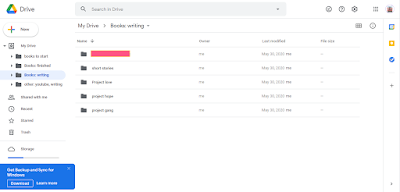The worst feeling in the world is you are halfway through a chapter or a book and your computer crashes, you didn't save the last four thousand words, and now you have to rewrite it all over again, or god forbid your laptop dies, and you can't get any of your books back, all those months spent writing for nothing.
This has happened to me more times than I can count, tears are shred, and sometimes I never rewrite that book again. Because of this, over the years, I have made a system to make sure I never lose any of my hard work, and I am going to let you in on how I make sure not to lose any of my work.
I thought after years of my laptop going flat or completely dying on me while I was writing that I had it completely under wraps on what to do to best protect my writing. Still, during Camp NaNoWriMo 2021, I found out how wrong I was when three times throughout the thirty days, my wifi glitched out as well as google docs. Google docs refused to save my work because I was writing so fast it couldn't keep up. My wifi would glitch right as it tried to, so it would come up with an error message, one that if you dismissed it would refresh the page, but you couldn't even copy and paste any of the words before they disappeared; it was a writer's worst nightmare.
That was the real reason I decided to make this blog post because when I went searching for ways around it, It in the past and even now, I could only find one other blog post touching on this topic which really surprised me; I don't know if I was using the wrong search terms or what but whatever it was I knew I needed to let you guys in on how I protect my work.
So now, let's get down to the real answer on how to protect your work as much as possible as to not lose any words.
The answer comes in many different stages, from the saving process to the backing upstage.
The backing up stage I have completely figured out, it sounds extreme, and it can be, but since doing this, I haven't lost any of my books.
I invested in a hard drive, and I make sure after every writing session my book gets backed up to that, so if my laptop was to die, I have my work not only saved but easy to put onto my new laptop when I get one.
I also back up to google docs/google drive; that way, I can work on my books on the go as well as when my laptop blows up and not have to wait ages or lose motivation.
Now the saving process is a bit harder because you never know when you will lose work, and if you were to save your work after each word,, you oud get nothing done, that's why I thought google docs was the good place to write because it automatically backs up your work.
Now I automatically manually save my work whenever I stop writing, if that's because I am thinking of what needs to happen next or whatever the reason I stop is. There are plenty of websites you can write on that will save your writing for you, but after my experience with google docs, I don't trust it. I will also copy and paste any work I have just done onto a note pad on my laptop and save that, so if something was to happen, I have a backup.
Sadly no way is foolproof, and I know I will still lose work, but I try and do everything I can to prevent that.
How do you save your work? let me know in the comments


